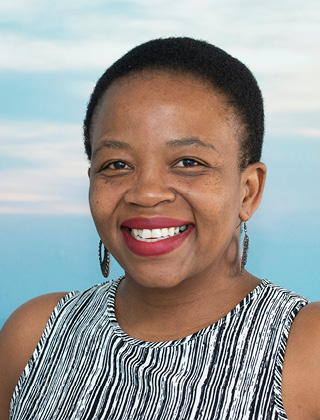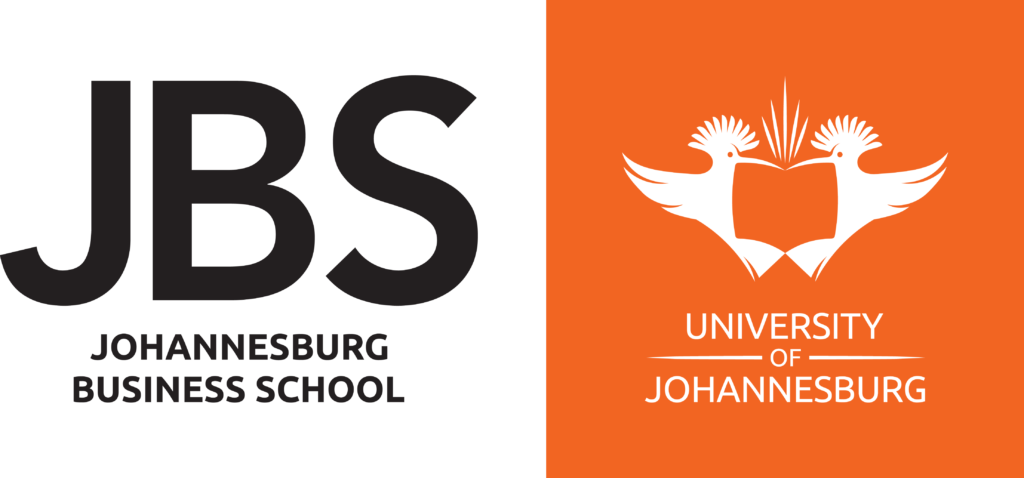Tumi Nkosi, the Director: Executive Education & Programmes Unit at the Johannesburg Business School, is calling on all leaders to step up and be counted.
The Executive Education & Programmes Unit is the youngest department at the The Johannesburg Business School (JBS), which is the youngest faculty of the world-renowned University of Johannesburg (UJ). The Unit was created to be flexible and agile to serve to match the dynamism of reskilling leaders and managers in an increasingly digitised business landscape.
The JBS–which lives by its motto of ‘The business of reimagining your future’–promises to provide ‘relevant, practical knowledge and skills for all students by using an innovative teaching style that is authentically African’ and which is ‘geared to the complex environment of the digital era’.
This promise to students is driven by a highly-skilled staff and faculty base. Tumi Nkosi, who is the Director: Executive Education & Programmes Unit , is one of those driving forces. From a brand perspective, the JBS is known for being young, vibrant, and agile; characteristics which Nkosi believes go hand-in-hand with the city they are based in.
“We are committed to personifying the spirit of the city whose name we carry, and that is how we market to potential students and markets. Johannesburg might be rough around the edges, but it holds many opportunities for those who dare to dream and think differently,” Nkosi tells us.
“We believe that talent comes in many different packages, and we should be agile and inclusive enough to embrace its many shapes and forms. We create invigorating working environments to attract inspiring talent to drive the implementation of our strategy, and our aim is to have positive spillover effects from this, such as increased student retention and memorable student experiences.”
Given the current state of South African society and its economic woes, we as a nation are in desperate need of new leaders who are able to shift our dynamic and challenge us towards a prosperous future.
Finding and nurturing these leaders is a key component of the JBS strategy.
Nkosi, who grew up in an area called The Sixteens in Mamelodi East, explains: “Leadership is sorely needed in many areas of our society, so leadership and business education can no longer be associated with stuffy boardrooms. Leadership and business education should meet people where they are and, in Johannesburg, this can be anywhere–from a vibrant market in Soweto and glass-clad boardrooms in high-rise offices in Sandton, to the coffee shop situated across the M1 highway and aboard a Reavaya en-route to work on a Thursday morning.
“Our role is not to determine who should stay in or out of our school, but to inspire individual intelligence within current and future leaders, and create spaces for them to challenge assumptions, push boundaries, and grow societies of the future.”
One of the ways the JBS is able to work towards achieving this goal is through their Executive Education portfolio of programmes and they have been making huge strides since its inception.
Executive Education at JBS
The JBS Executive Education & Programmes Unit was launched in 2019 and was commercialised in 2020.
When the COVID-19 pandemic hit, there were fears that executive education programmes would suffer as a result. However, Nkosi reveals that what was expected to be a difficult time turned into a period of exponential growth.
She explains: “The original plan was to offer bespoke short programmes that focused on the development of entrepreneurs, but our clients wanted something completely different, so we quickly adapted to offer longer, customised programmes to support various digital transformation strategies that were at the top of our clients’ list of priorities at the time.”
The JBS strategy emphasises the development of functional and leadership intelligences within a specific context. These include the digital economy, sustainability, or any other context that our clients view as important to interrogate, test, and make sense of.
While the unit started with a plan to offer predominantly public programmes, clients demanded customised solutions with specific goals and tailored experiences–an area which Nkosi believes the JBS Executive Education & Programmes Unit shines in.
“While we have a small portfolio of public programmes that focus on contextual expertise and functional know-how, we place the human at the heart of these fundamental learning areas to drive inside-out innovation, productivity, and high-impact coupled with sustainable leadership competence. In summary, we offer tailored and customised programmes and a small but growing portfolio of market-led and uniquely positioned public programmes that change almost every year in line with market demands,” she adds.
This shift in direction to meet the demands and needs of clients and students has clearly worked wonders for the unit. While many institutions would look to sell their services in any way possible, the truth of the matter is that no one likes being sold to. It’s a counter-intuitive approach, but one that has worked wonders for the Unit.
“People buy into things because they are inspired, and I believe that our students and corporate client’s partner with JBS because we inspire a specific set of ideas that they want to be a part of. Leaders should enrol at JBS because we do leadership education differently. We believe that the innovation and transformation that we want to see starts with an individual,” Nkosi says.
“Look around you for some of the greatest ideas to come out of our country and the world at large–none of them were created by a company. The greatest ideas that we see today started with individual intelligence; Apple happened because of Steve Jobs and Steve Wozniack, not the other way around. The same goes for Microsoft and Bill Gates, Bathu Group Holdings and Theo Baloyi, Mogau Seshoene and The Lazy Makoti franchise. An individual sparked the idea because of individual intelligence – the basic idea humans are the source of the great change and transformation that we all seek.”
In this context, Nkosi believes that their role as a business school is to spark individual intelligence, create inspirational spaces to harness it, and empower students to fan its flames long after they graduate.
“Technological innovation, social transformation, and digital intelligence mean different things for different people, so education can no longer be a one-size-fits-all exercise. That is why leaders should enrol for our programmes–to find, inspire, spark, and fan the flames of their own brand of individual intelligence, because we all have it,” she states.
Building on success, learning from challenges
With its solid foundation, the JBS Executive Education & Programme Unit has been able to achieve much success to date.
One of their major successes comes in the shape of a start-up they have launched. While Nkosi is unable to give us too many details on the start-up itself, much of its success is born from their belief that “management education should be a personalised and customised undertaking”.
She reveals: “The Executive Education & Programmes Unit created a start-up in 2022 which attracted R2 million in revenue during its first six months of existence. The start-up has doubled this revenue in 2023 so far and might be ready for its first round of funding. Although we cannot share much about the start-up, what we will say is that the company drives our belief that management education should be a personalised and customised undertaking, and the growth of this start-up may be a sign that the market agrees with our viewpoint.”
Success is not limited to the Executive Education Programme, with the JBS as a whole making impressive strides across the board.
The school’s Academics Unit launched the first ever online MBA in South Africa in 2021, and the first class graduated in April this year.
The school also launched the first ever Artificial Intelligence hub in the country as part of the Department of Communications and Digital Technology’s South African Institute of Artificial Intelligence. The aim of the hub is to explore and implement responsible ways of implementing AI in the country. A number of initiatives, including Single Digital Identity and Smart Agriculture, are already under the hub’s growing portfolio of catalytic projects
While the successes are plain to see, challenges haven’t been far behind.
The best are able to learn from challenges and use those lessons to further enhance their operations. This is exactly what Nkosi, and her team have been able to achieve, with one of the most important lessons being to stay relevant.
“In our first three years of existence, our biggest challenge was to uniquely position ourselves against a fi犀利士 ercely competitive market. We made progress, but the 2020 pandemic forced us to rethink our positioning and assumptions. Our strategy evolved within the digital transformation agenda, but we knew that while unique, the positioning would probably be unsustainable due to the speed of change in an increasingly digitised economic landscape,” Nkosi explains.
“Therefore, and in our experience so far, our biggest challenge is to remain relevant to our various stakeholders, especially current and future students, and alumni. It is a challenge that excites us because it forces us to keep thinking outside of the box. The JBS is a digital nomad, and we believe that we will continue attracting the right talent to stretch and challenge us for the better as we enter the second half of our first decade of existence.”
Looking to the future
The JBS has managed to position itself to be agile, relevant, and responsive to the emerging needs of their stakeholders, clients, and students.
This strategy, Nkosi believes, continues to pay handsomely for the school.
She explains: “Our focus is to grow in areas that our clients and students want us to expand. We will continue staying close to players in the areas that we have identified as strategic for our growth and expansion plans, and the benefit will remain the same–leadership and business education that is richly steeped in context, and strongly personalised to match the evolving needs of modern-day leaders, both in South Africa and across our continent.”
As the JBS approaches its sixth birthday in 2023, Nkosi says that they are excited about the next phase of their growth.
She believes that the Fourth Industrial Revolution (4IR) holds the biggest promise to reverse the inequalities and social ills that the first three industrial revolutions unintentionally created.
However, if leadership remains silent about what the 4IR means for the country and continent, then this revolution might change from holding the biggest promise to being one of the biggest threats to face populations in emerging economies.
“We have never had as many opportunities to participate in the global economy as we have today, but these promises will remain exactly that in the absence of strong and consistent leadership voices. We need strong leadership voices to intelligently interrogate emerging technologies and continuously define if and how we will incorporate them to benefit everyone as equitably as possible. The JBS is committed to shaping the kind of leadership education that will amplify these voices. I hope that current and prospective leaders are up for the challenge, because the very existence of millions of people in the country and across the continent is dependent on it,” she concludes.

Where leaders are lacking, according to Tumi Nkosi
- “In the context of leadership in general, many would agree that leaders lack time. I had an interesting conversation with an executive director of a leading company who attended one of our executive programmes a few weeks ago. She complained that, despite her seniority, she spends the majority of her time on tactical activities, and only gets time to think, reflect, and strategise over the weekend.”
- “In the context of digital innovation and transformation, I believe that leaders lack a voice. For example, artificial intelligence or AI is on everyone’s lips. Leaders of the West have already decided that AI poses a significant risk to human evolution and existence, but I am yet to hear strong voices from African leaders about their thoughts on AI. I recently had the pleasure to conduct a qualitative study on project management use of AI in South Africa with a group of intelligent, young project managers. The project managers that I spoke to agreed that they experienced a lack of executive messaging and leadership direction on AI, and if and how it should be implemented within their respective organisations. Given the transformative powers that AI holds, leaders should amplify their voices about what this technology means and how to use it to address some of the many social issues that face a country like South Africa.”


